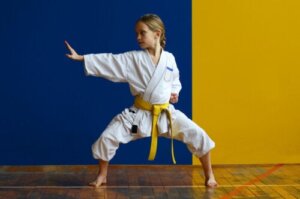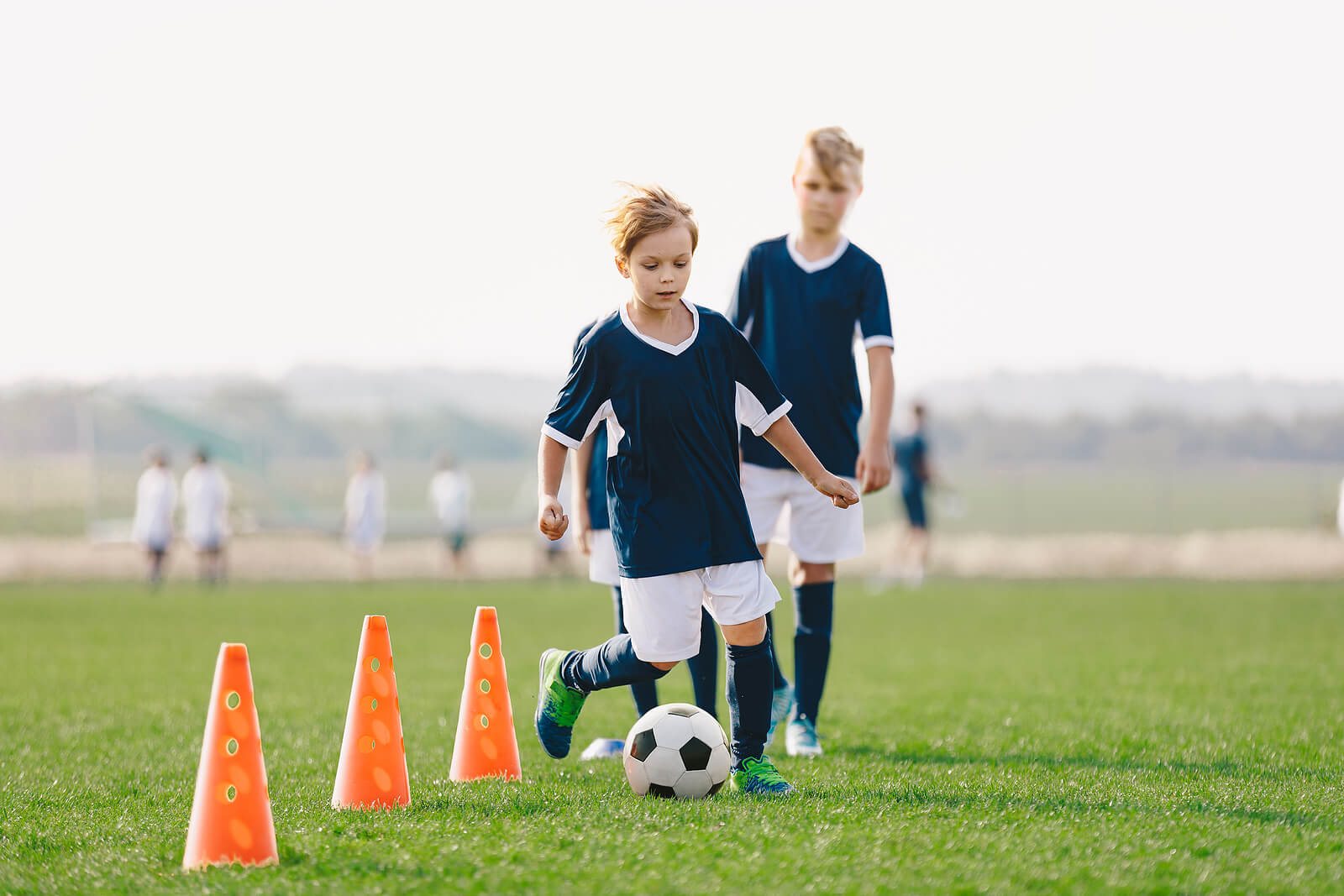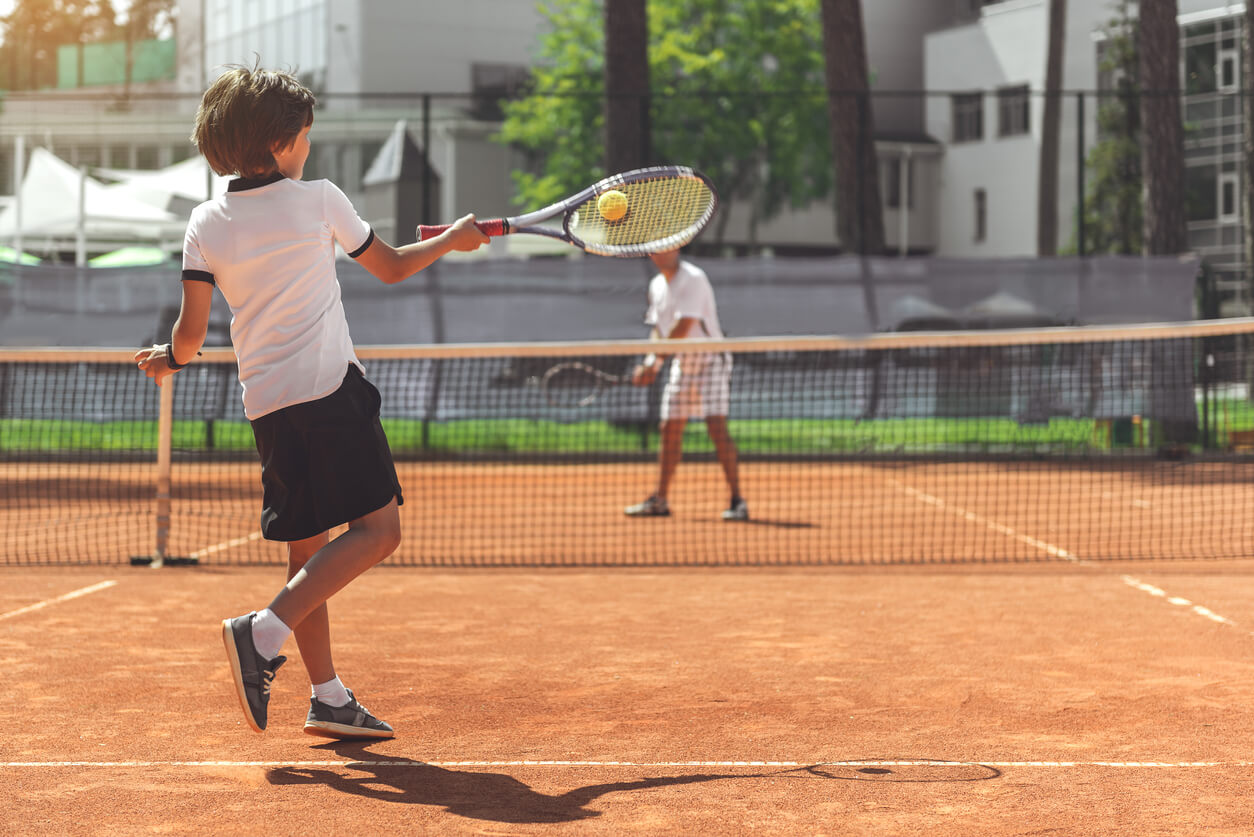5 Sports to Improve Children's Psychomotor Skills


Written and verified by degree in physical education and sports Andrés Felipe Cardona Lenis
Referring to the psychomotor skills of children involves understanding that every physical movement has its origin in the child’s mind. This aspect is fundamental in human development and, therefore, must be treated from the very beginning. There are several ways to work on psychomotor skills, one of which is the practice of sports. In that order of ideas, in the following article, we’ll show you a series of recommendations for your children to put into practice.
Before continuing, remember that all sports activities should be to the liking of children. Therefore, the benefits will be much more relevant and they’ll be constantly motivated.
Sports for children’s psychomotor skills
Physical movement has become more relevant with the passing of time as well as research. In order for the integral development of human beings to occur, physical movement must take place early on.
However, the psychomotor skills of children become much more important because this aspect must be worked from the physical, physiological, and psychological bases. As mentioned above, it’s possible to improve psychomotor skills through various sports.
Soccer

Soccer is one of the favorite sports for parents and children. As one of the most practiced sports, it’s often the first one experienced by children around the world.
However, it’s not only recommended because it’s popular but also because of the benefits it brings to children’s psychomotor skills. Its regular practice stimulates different physical abilities, among which coordination, agility, and balance stand out.
In this regard, the child will learn to control their motor skills through their thoughts. This process will be built step by step through soccer.
Swimming’s another great way to improve children’s psychomotor skills
To make a list of sports and not include swimming is practically illogical. This sport offers benefits in all possible fields, among which are the psychomotor skills of children. For this reason, it’s known as the most complete sport.
In the water, children must be aware of a large number of movements and physical processes. Technical gestures such as stroking and kicking, as well as breathing, make children increase their concentration. In addition, the continuous practice of this sport favors the development of physical abilities such as endurance, coordination, strength, and flexibility.
Karate
Karate is one of the most famous martial arts in the world, but its practice tends to be more popular in eastern regions. This combat sport focuses on respect for the opponent as well as control of one’s own body.
This discipline is recommended to improve the psychomotor skills of children, as it promotes motor and mental self-knowledge. In addition, it requires a high degree of communication with peers.
Children can also learn to improve aspects related to emotions, such as anger management and impulse control. In this way, psychomotor skills can also increase.
Basketball to improve children’s psychomotor skills
The series of movements involved in a sport such as basketball suggests that psychomotor development should be high. As a parent, imagine your child running while bouncing a ball with their hands.
In order for the above situation to take place, children’s psychomotor skills must be high. The methodological exercises of basketball favor this aspect.
At the same time, they also contribute to the development of physical capacities such as coordination, agility, and resistance. In addition to these, the abilities to react and make decisions are also developed.
Tennis

Sit down with your child to watch a tennis match. If they’re older than 6 or 7, ask them what they think and what they see. They’ll probably talk about how fast the ball is moving or how the players are moving around the court.
If you can get your child to a tennis academy, do so. Moving around the court as well as hitting the ball with the racquet both favor the psychomotor skills of children. In this sport discipline, coordination, strength, and agility converge. Undoubtedly, it’s a good way to favor the mind and body.
Prioritize the basics, as well as your child’s preferences
In spite of the previous recommendations, sports to improve the psychomotor skills of children should be based on their personal preferences. Therefore, make sure that your child does a sport that motivates them and makes them happy.
Consult your family doctor and listen to their advice on what sports your child can do. At the same time, it’s important for sports disciplines to have an important pre-sport educational component, especially if the children are under 5 years old. This way, the bases of the little ones’ psychomotor skills will be much stronger and their development will be optimal.
Referring to the psychomotor skills of children involves understanding that every physical movement has its origin in the child’s mind. This aspect is fundamental in human development and, therefore, must be treated from the very beginning. There are several ways to work on psychomotor skills, one of which is the practice of sports. In that order of ideas, in the following article, we’ll show you a series of recommendations for your children to put into practice.
Before continuing, remember that all sports activities should be to the liking of children. Therefore, the benefits will be much more relevant and they’ll be constantly motivated.
Sports for children’s psychomotor skills
Physical movement has become more relevant with the passing of time as well as research. In order for the integral development of human beings to occur, physical movement must take place early on.
However, the psychomotor skills of children become much more important because this aspect must be worked from the physical, physiological, and psychological bases. As mentioned above, it’s possible to improve psychomotor skills through various sports.
Soccer

Soccer is one of the favorite sports for parents and children. As one of the most practiced sports, it’s often the first one experienced by children around the world.
However, it’s not only recommended because it’s popular but also because of the benefits it brings to children’s psychomotor skills. Its regular practice stimulates different physical abilities, among which coordination, agility, and balance stand out.
In this regard, the child will learn to control their motor skills through their thoughts. This process will be built step by step through soccer.
Swimming’s another great way to improve children’s psychomotor skills
To make a list of sports and not include swimming is practically illogical. This sport offers benefits in all possible fields, among which are the psychomotor skills of children. For this reason, it’s known as the most complete sport.
In the water, children must be aware of a large number of movements and physical processes. Technical gestures such as stroking and kicking, as well as breathing, make children increase their concentration. In addition, the continuous practice of this sport favors the development of physical abilities such as endurance, coordination, strength, and flexibility.
Karate
Karate is one of the most famous martial arts in the world, but its practice tends to be more popular in eastern regions. This combat sport focuses on respect for the opponent as well as control of one’s own body.
This discipline is recommended to improve the psychomotor skills of children, as it promotes motor and mental self-knowledge. In addition, it requires a high degree of communication with peers.
Children can also learn to improve aspects related to emotions, such as anger management and impulse control. In this way, psychomotor skills can also increase.
Basketball to improve children’s psychomotor skills
The series of movements involved in a sport such as basketball suggests that psychomotor development should be high. As a parent, imagine your child running while bouncing a ball with their hands.
In order for the above situation to take place, children’s psychomotor skills must be high. The methodological exercises of basketball favor this aspect.
At the same time, they also contribute to the development of physical capacities such as coordination, agility, and resistance. In addition to these, the abilities to react and make decisions are also developed.
Tennis

Sit down with your child to watch a tennis match. If they’re older than 6 or 7, ask them what they think and what they see. They’ll probably talk about how fast the ball is moving or how the players are moving around the court.
If you can get your child to a tennis academy, do so. Moving around the court as well as hitting the ball with the racquet both favor the psychomotor skills of children. In this sport discipline, coordination, strength, and agility converge. Undoubtedly, it’s a good way to favor the mind and body.
Prioritize the basics, as well as your child’s preferences
In spite of the previous recommendations, sports to improve the psychomotor skills of children should be based on their personal preferences. Therefore, make sure that your child does a sport that motivates them and makes them happy.
Consult your family doctor and listen to their advice on what sports your child can do. At the same time, it’s important for sports disciplines to have an important pre-sport educational component, especially if the children are under 5 years old. This way, the bases of the little ones’ psychomotor skills will be much stronger and their development will be optimal.
All cited sources were thoroughly reviewed by our team to ensure their quality, reliability, currency, and validity. The bibliography of this article was considered reliable and of academic or scientific accuracy.
- Neto, O. B., Barbieri, F. A., Barbieri, R. A., & Gobbi, L. T. B. (2009). DESEMPEÑO DE LA AGILIDAD, VELOCIDAD Y COORDINACIÓN DE NIÑOS PRACTICANTES Y NO-PRACTICANTES DE FÚTBOL. https://www.researchgate.net/profile/Lilian-Gobbi/publication/268431111_DESEMPENO_DE_LA_AGILIDAD_VELOCIDAD_Y_COORDINACION_DE_NINOS_PRACTICANTES_Y_NO-PRACTICANTES_DE_FUTBOL/links/55358a120cf218056e9299c8/DESEMPENO-DE-LA-AGILIDAD-VELOCIDAD-Y-COORDINACION-DE-NINOS-PRACTICANTES-Y-NO-PRACTICANTES-DE-FUTBOL.pdf
- Espinosa Chamba, G. G. (2016). La práctica de la natación como un medio para potenciar el desarrollo motriz. http://repositorio.utmachala.edu.ec/handle/48000/9835
- Avila Vanegas, J. H. (2021). ESTRATEGIA PEDAGÓGICA PARA MEJORAR EL DESARROLLO PSICOMOTRIZ A TRAVÉS DEL BALONCESTO: UN ESTUDIO SOBRE LAS DEFICIENCIAS COGNITIVAS EN ESTUDIANTES. http://repositorio.uwiener.edu.pe/handle/123456789/4399
- Flautero López, N. Y. (2011). Actividades psicomotrices y lúdico-recreativas como medio del programa de la clase de tenis para reducir los niveles de trastorno por déficit atención e hiperactividad (TDAT) de una niña de ocho años en la escuela de tenis del club del comercio de Bogotá. https://repository.unilibre.edu.co/bitstream/handle/10901/5979/FlauteroLopezNormaYisela2011.pdf?sequence=1&isAllowed=y
- Delgado, A., Collado, E., & Rivadeneyra, M. L. (2002). Desarrollo motor en karate en niños y niñas de las categorías benjamín, alevín e infantil (5-11 años). Revista Digital-Buenos Aires (45) febrero de. https://www.efdeportes.com/efd45/karate.htm
- Bilbao, L., Corres, U., & Urdampilleta, A. (2012). La importancia de la psicomotricidad en la actividad físico-deportiva extraescolar. Digital. Buenos Aires, 1. https://www.efdeportes.com/efd165/la-importancia-de-la-psicomotricidad.htm
This text is provided for informational purposes only and does not replace consultation with a professional. If in doubt, consult your specialist.








